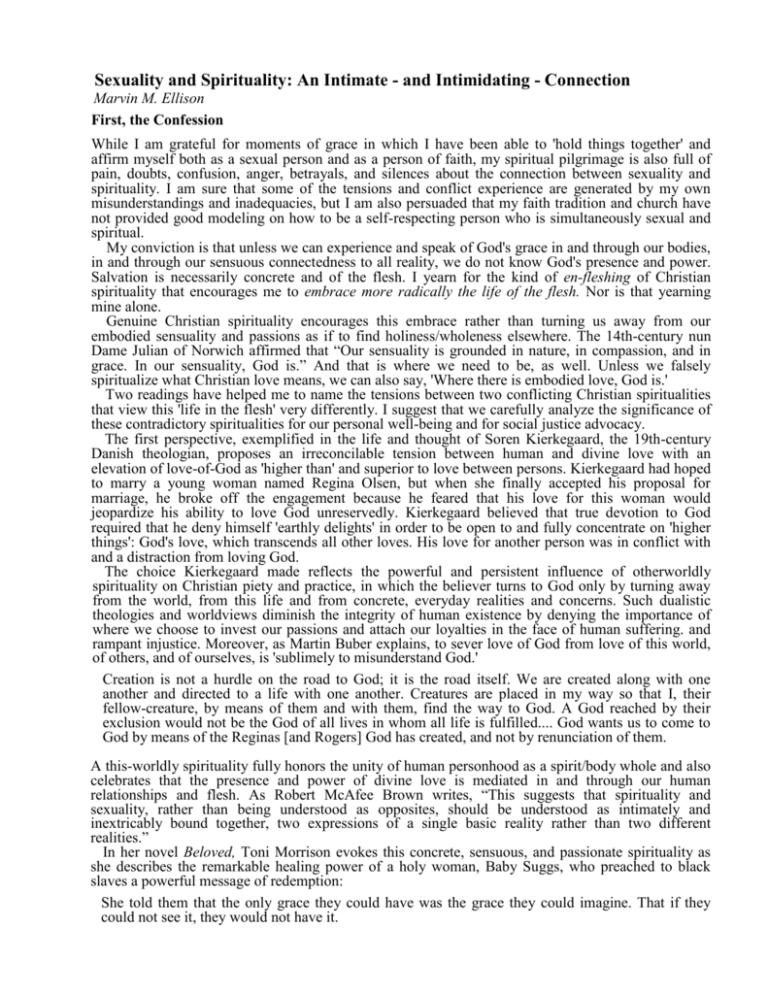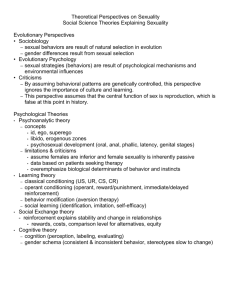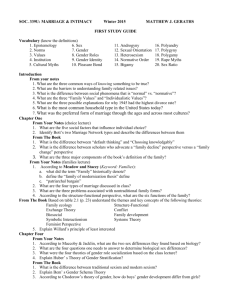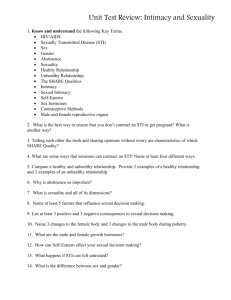
Sexuality and Spirituality: An Intimate - and Intimidating - Connection
Marvin M. Ellison
First, the Confession
While I am grateful for moments of grace in which I have been able to 'hold things together' and
affirm myself both as a sexual person and as a person of faith, my spiritual pilgrimage is also full of
pain, doubts, confusion, anger, betrayals, and silences about the connection between sexuality and
spirituality. I am sure that some of the tensions and conflict experience are generated by my own
misunderstandings and inadequacies, but I am also persuaded that my faith tradition and church have
not provided good modeling on how to be a self-respecting person who is simultaneously sexual and
spiritual.
My conviction is that unless we can experience and speak of God's grace in and through our bodies,
in and through our sensuous connectedness to all reality, we do not know God's presence and power.
Salvation is necessarily concrete and of the flesh. I yearn for the kind of en-fleshing of Christian
spirituality that encourages me to embrace more radically the life of the flesh. Nor is that yearning
mine alone.
Genuine Christian spirituality encourages this embrace rather than turning us away from our
embodied sensuality and passions as if to find holiness/wholeness elsewhere. The 14th-century nun
Dame Julian of Norwich affirmed that “Our sensuality is grounded in nature, in compassion, and in
grace. In our sensuality, God is.” And that is where we need to be, as well. Unless we falsely
spiritualize what Christian love means, we can also say, 'Where there is embodied love, God is.'
Two readings have helped me to name the tensions between two conflicting Christian spiritualities
that view this 'life in the flesh' very differently. I suggest that we carefully analyze the significance of
these contradictory spiritualities for our personal well-being and for social justice advocacy.
The first perspective, exemplified in the life and thought of Soren Kierkegaard, the 19th-century
Danish theologian, proposes an irreconcilable tension between human and divine love with an
elevation of love-of-God as 'higher than' and superior to love between persons. Kierkegaard had hoped
to marry a young woman named Regina Olsen, but when she finally accepted his proposal for
marriage, he broke off the engagement because he feared that his love for this woman would
jeopardize his ability to love God unreservedly. Kierkegaard believed that true devotion to God
required that he deny himself 'earthly delights' in order to be open to and fully concentrate on 'higher
things': God's love, which transcends all other loves. His love for another person was in conflict with
and a distraction from loving God.
The choice Kierkegaard made reflects the powerful and persistent influence of otherworldly
spirituality on Christian piety and practice, in which the believer turns to God only by turning away
from the world, from this life and from concrete, everyday realities and concerns. Such dualistic
theologies and worldviews diminish the integrity of human existence by denying the importance of
where we choose to invest our passions and attach our loyalties in the face of human suffering. and
rampant injustice. Moreover, as Martin Buber explains, to sever love of God from love of this world,
of others, and of ourselves, is 'sublimely to misunderstand God.'
Creation is not a hurdle on the road to God; it is the road itself. We are created along with one
another and directed to a life with one another. Creatures are placed in my way so that I, their
fellow-creature, by means of them and with them, find the way to God. A God reached by their
exclusion would not be the God of all lives in whom all life is fulfilled.... God wants us to come to
God by means of the Reginas [and Rogers] God has created, and not by renunciation of them.
A this-worldly spirituality fully honors the unity of human personhood as a spirit/body whole and also
celebrates that the presence and power of divine love is mediated in and through our human
relationships and flesh. As Robert McAfee Brown writes, “This suggests that spirituality and
sexuality, rather than being understood as opposites, should be understood as intimately and
inextricably bound together, two expressions of a single basic reality rather than two different
realities.”
In her novel Beloved, Toni Morrison evokes this concrete, sensuous, and passionate spirituality as
she describes the remarkable healing power of a holy woman, Baby Suggs, who preached to black
slaves a powerful message of redemption:
She told them that the only grace they could have was the grace they could imagine. That if they
could not see it, they would not have it.
'Here,' she said, 'in this here place, we flesh; flesh that weeps, laughs; flesh that dances on bare
feet in grass. Love it. Love it hard. Yonder they do not love your flesh. They despise it … You got to
love it. This is flesh I'm talking about here. Flesh that needs to be loved … Love our neck; put a hand
on it, grace it, stroke it and hold it up.'
A this-worldly spirituality rejects the notion that salvation involves escape from the body or a
turning away from the embodied goodness around us. Rather, authentic faithfulness looks to the
material, the mundane, the corporeal as the primary locus for disclosing both human and divine power;
it regards physical touch as a privileged mode for communicating deep caring and mutual pleasure in
company with others.
Christian ministry is sharing power, and naming and aligning ourselves with that sacred and
awesome power that flows in and through us to bring wholeness, well-being, integrity, and at-one-ness
of human life in relation to others and the created order. Sexuality and spirituality are intimately and
unavoidably connected because they deal with that kind of power-in-relation we believe to be
genuinely sacred and life-giving. Sexuality, our embodied sensuous connectedness to all reality, is our
human capacity and longing for intimacy and communion with others and with God. Sexual desire
lures us toward connecting with others and helps us gain strength in our vulnerability to receive as
well as give affirmation and care.
Otherworldly Christian spirituality has a noticeable fear of, as well as fixation with, the power of
sex. The pervasive discomfort with the body and dis-ease about sex show the ongoing power of a
spirit/body dualism and the related male/female dualism that are so characteristic of Western
Christianity. The depth of body-alienation and, therefore, self-alienation in this culture is clearly
evident. Erotic passion is continually disparaged as corrupting and as an evil power at war with
positive spiritual energy. Therefore, to trust that eroticism is essential to our human well-being and to
our God-relation requires courage. Courageous, too, are those who affirm that erotic power is a moral
good, that is, the source of creative personal power seeking mutual relations with others and grounded
in care, self-respect, and other regard.
I am convinced that a spirituality without erotic passion becomes lifeless and cold. God becomes an
abstraction, an idea rather than a living presence in our lives. I am searching for a Christian spirituality
that acknowledges that the human calling is to make passionate love in this world, in our beds and in
our institutions. To love well means to share the gift of life with zeal and great generosity and to seek
right relations with all others, relations of genuine equality and mutuality, of shared power and
respect.
The pervasive fear of sex and of strong passion which the church has encouraged is coming
perilously close to killing off our love of life in the flesh and our passion for justice in the church and
in the world. As I understand Christian faithfulness, the passionate doing of justice - of righting
distorted power dynamics and breaking every pattern of domination and subordination - is at the heart
of any spirituality worth having. Owning the goodness of our sexuality and of our erotic desire for
wholeness and connectedness is, therefore, not inherently selfish or self-indulgent, but rather the
indispensable grounding for engaging joyfully in working to create justice for ourselves and others.
An incarnational faith skittish about the goodness of the body and about sensuous pleasure may well
bore itself to death. In order to reclaim its spiritual integrity, the church must stop discouraging sensuous touch and communication between consenting adults and redirect its attention toward encouraging
- and celebrating - responsible, loving, empowering mutual sexual relationships wherever they occur,
among the married and the not-married, among gays and lesbians, among heterosexual persons. The
church must also overcome its preoccupation with questions of sexual orientation and cease its endless
harangues about the dangers and illegitimacy of sexual diversity. It is high time for the church to
'come of age' about sex and sexual pluralism in the church and in the society.
Ecclesial maturity about matters of sexual intimacy also requires us to acknowledge candidly that
our conventional categories for naming normal and abnormal sexuality distort rather than disclose
what is most important and valuable about our sexuality. What matters ethically, humanly, is not the
sameness - or difference - of the gender of persons in relation, but rather the quality and character of
their relationship. Not who we are, but how we are with each other is ethically significant.
Simply put, the fundamental debate within the church is not over the rules of who sleeps with whom
but rather a conflict over the normative character of our sexual and social relationships. What is at
issue are our values and commitments to an inclusive and egalitarian 'ethic of common decency.' We
need to be teaching - and struggling to embody - a higher, more demanding sexual ethic than one that
passes judgment exclusively on the basis of patriarchal sexual categories.
The Contemporary Crisis of Sexuality
At the heart of this crisis of sexuality is the ongoing struggle to overcome male gender superiority
throughout the social order, including in the pulpit and the bedroom. The church will not offer much
constructive counsel on human sexuality unless we deal forthrightly with how sexism and
heterosexism distort all dynamics of gender relations and human intimacy patterns.
To analyze the contemporary crisis of sexuality, we need to understand that human sexuality is not
predetermined naturally or dictated by biological mandates but rather is intensely malleable, constantly
reshaped by social and cultural dynamics. Sexuality is socially constructed in myriad, intricate ways.
Far from being a fixed 'essence' or transcultural constant, human sexuality forever is renegotiated and
redefined among contending social forces and, therefore, also is subject to greater humanization or
dehumanization.
Human sexuality is always culturally encoded, ascribed with certain meanings and shaped according
to certain values and societal purposes. 'Reading' a particular sexual code requires an acknowledgement that every society makes arrangements for the organization of erotic life. Our society - and our
churches - are not unusual in this regard. Moreover, it is important to recognize that the nature of sex
has to do not only with sex (as an exchange of erotic energy) but also with what it means to be male
and female and with the proper ordering of gender relations. Critical questions about any sexual code
include asking about who is and who is not empowered to name themselves and be listened to, in the
valuing of their lives in relation to others.
In our patriarchal culture an elaborate and historically complex structuring of sexuality has been
built on the assumption of fundamental differences and inequality between men and women, and upon
the moral rightness of male dominance and control of women's lives and their bodies. Men are
socialized to exercise power over others and to stay in control of their feelings by remaining 'logical,'
'rational,' 'cool.' Women, on the other hand, are socialized into social dependency and encouraged to
accept their powerlessness 'for their own good.'
By the logic of sexist dualisms, if men are strong, physical, rational, and in control, women must be
weak, spiritual, intuitive and emotional, and dependent, under someone else's control. In sum, men and
women are thought to be complementary beings, each a half personality. In the sex act, the two are
brought together to become one whole and move under his control.
This perspective also suggests that erotic desire is sparked by opposites attracting. Patriarchal
eroticism makes inequality of power and status sexy and desirable. Sex is often experienced as a
dynamic of conquest and surrender, a matter of exercising power and control over another or of being
controlled and under someone else's power and direction. As feminist analyses of the pornography
industry rightly show, male domination over women and children is eroticized and, through powerful
visual imagery, reinforced as both natural and right.
Sexism declares that male gender superiority and power over women is morally good, and also
beneficial to women. Heterosexism extends the logic of sexism by insisting that 'real' men dominate
women sexually and socially and that 'normal' women are sexually submissive and socially compliant,
ready to make their lives available for the service of others. Heterosexism (or compulsory
heterosexuality) stigmatizes gay men and lesbians as sexual deviants, but pressures all persons to play
their 'proper' sex-stereotyped roles and conform to dominant/subordinate power dynamics.
Heterosexism insists that all men are more powerful than women, and that some men are more
powerful than others.
Men who do not properly perform their dominant role vis-a-vis women are treated as failed men and
often perceived to be homosexual, whether accurately or not, and 'like women,' that is, without power
and status. Any strong, self-assertive, and independent woman will likely be labeled lesbian, a 'manhater,' because she does not keep to her place of socially constructed inferiority. Heterosexism and
homophobia by stigmatizing sexual non-conformity, reinforce compliance to sexist social roles and
relations. External enforcements, including violence, teach all of us that penalties will be meted out to
those who do not stay within prescribed roles of gender inequality.
The contemporary crisis of sexuality is fundamentally a crisis in heterosexuality, in the dominant
cultural pattern for male/female social and sexual relations. In a society in which sexism and
heterosexism are pervasive, the preoccupation with the gender of sexual partners is not surprising.
With whom we have sex, the gender of the person to whom we are erotically attracted, is given
enormous weight and has become the standard to determine whether persons are 'normal' or
'abnormal,' 'deviant' or not. Our dominant sexual code insists that only heterosexuality is good but
more importantly, that only a sexist ordering of social relations - male dominance and female
submission - is legitimate and proper.
Christian spirituality is deeply implicated in this unjust system of alienated power relations insofar
as the church continues to equate what is moral with what is sexist and unjust, namely, that 'good sex'
and proper sexual and social relations require men to stay on top and in control of 'their' women, and
for women passively to accept the inevitability of such arrangements. As long as the problem of
sexuality continues to be misnamed in the church as 'the problem of homosexuality' rather than 'the
problem sexism and heterosexism', we will castigate those individuals who deviate from the
patriarchal norm and fail to challenge the institutionalized injustice which blocks the Spirit's
movement in our midst for renewal and transformation. 'The basic issue,' as James Nelson puts the
matter, 'is really not about "them," but about all of us. How can we live less fearfully and more
securely in the grace of God?'
Resources for Reconstructing Christian Theology and Ministry with Respect to Sexuality
What is shaking the foundations in the church and society is the open call, especially by feminist
women and gay men, to struggle for a nonsexist moral order in the bedroom no less than in the
boardroom, the pulpit, and the seminary classroom.
We need to be very candid about this struggle. We work, play, make love, raise children, and pray in
the midst of a life-rending ideological battle between a patriarchal and a feminist liberation paradigm
of human social and sexual relations. This conflict is not something to bemoan but rather accept and
work through, as we acknowledge that each and every theological and moral claim we make is
ideological, through and through, in either supporting or challenging existing social arrangements and
norms. Not conflict but the evasion of conflict signals the loss of genuine spiritual power and
'aliveness.'
The reasons for so much fear of feminism and gay liberation in the church is that these movements
no longer grant moral legitimacy and authority to the patriarchal order of things. Quite openly, they
aim to topple the patriarchal family structure, the anchor for the public moral ordering of all other
social relations. The fear among defenders of male gender privilege is that this seditious sentiment
may, indeed, be catching! Recruitment to new loyalties, especially strong commitment to struggle for
genuine gender and sexual equality, is very fearsome.
Resistance to feminism and gay liberation is best viewed as resistance to adopting a radical ethic of
justice and mutuality in matters of sexual intimacy and social relations. Resistance stems, in part, from
the fear of many men that if “full, consensual sexuality were to become the standard for acceptable
sexual relations, they would be deprived of many, perhaps most, of the sexual acts they now enjoy.”
That is the conclusion of the authors of the study Rape: The Price of Coercive Sexuality.
There is much truth in that observation. I also believe that religious persons and institutions, as well
as our thinking and perceptions, are deformed by participation in dynamics of oppression. Similarly,
persons and institutions are transformed by genuine resistance to injustice. A liberating Christian
spirituality embraces the movement toward equalizing both gender and all other social relations as a
gift of new life. In that struggle is found hope and joy, and also allies. Joining with others is especially
important because spirituality concerns not what we do in solitude or isolation but rather in
community. Since few of us were adequately educated by church or family to live as genuine equals
with others, our best resource to learn mutuality before God and with others may well be the sexual
outcasts among us, those marginalized as outsiders and non-conformists to the patriarchal family especially feminist women and gay men who are struggling to reorder human sexuality in more loving
and just directions.
What makes the telling difference, in our sexual ethic and in our sexual theologies, is not our
biology, sexual orientation, or 'lifestyle.' Rather, Christian spirituality is shaped primarily by our
engagement, or by our refusal to participate, in the work of justice.
I suggest the church ponder the difference and unavoidable conflict between a patriarchal Christian
spirituality, on the one hand, and an egalitarian, justice-centered Christian spirituality, on the other.
This division marks the great divide in our church today.
[ Source: Christian Perspectives on Sexuality and Gender, eds. Adrian Thatcher and Elizabeth Stuart.
Michigan: Eerdmans Publishing Company, 1996; and also Church and Society 80:2 (NovemberDecember l989), 26-34.]










